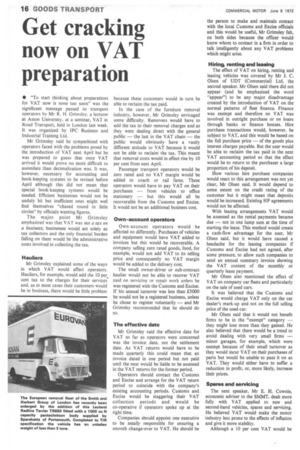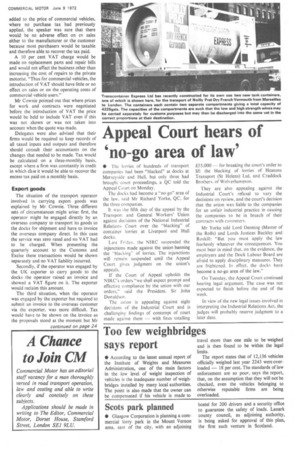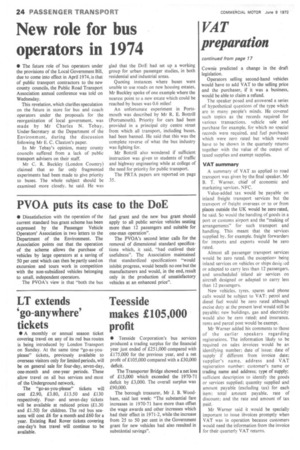Get cracking now on VAT preparation
Page 18

Page 19

Page 26

If you've noticed an error in this article please click here to report it so we can fix it.
• "To start thinking about preparations for VAT now is none too soon" was the significant message passed to transport operators by Mr R. H. Grimsley. a lecturer at Aston University, at a seminar, VAT in Road Transport, held in London last week. It was organized by IPC Business and Industrial Training Ltd.
Mr Grimsley said he sympathized with operators faced with the problems posed by the introduction of VAT next April but he was prepared to guess that once VAT arrived it would prove no more difficult to assimilate than decimalization was. It was, however, necessary for accounting and book-keeping systems to be revised before April although this did not mean that special book-keeping systems would be needed. Efficient businesses would not be unduly hit but inefficient ones might well find themselves "chased round in little circles" by officials wanting figures.
The major point Mr Grimsley emphasized was that VAT was not a tax on a business; businesses would act solely as tax collectors and the only financial burden falling on them would be the administrative costs involved in collecting the tax.
Hauliers Mr Grimsley explained some of the ways in which VAT would affect operators. Hauliers, for example, would add the 10 per cent tax to the charges for their services and, as in most cases their customers would be in business, there would be little problem because these customers would in turn be able to reclaim the tax paid.
In the case of the furniture removal industry, however, Mr Grimsley envisaged some difficulty. Removers would have to add the tax to their removal charges and as they were dealing direct with the general public — the last in the VAT chain — the public would obviously have a vastly different attitude to VAT because it would not be able to reclaim the tax. This meant that removal costs would in effect rise by 10 per cent from next April.
Passenger transport operators would be zero rated and no VAT margin would be added to coach or rail fares. These operators would have to pay VAT on their purchases — from vehicles to office stationery — but this would all be recoverable from the Customs and Excise. It would not be an additional business cost.
Own -account operators Own-account operators would be affected no differently. Purchases of vehicles and equipment would have VAT added to invoices but this would be recoverable. A company selling zero rated goods, food, for example, would not add VAT to its selling price and consequently no VAT margin would be added to the delivery cost.
The small owner-driver or sub-contract haulier would not be able to recover VAT paid on servicing or repair work unless he was registered with the Customs and Excise. If his annual turnover was less than £3000 he would not be a registered business, unless he chose to register voluntarily — and Mr Grimsley recommended that he should do The effective date Mr Grimsley said the effective date for VAT so far as operators were concerned was the invoice date, not the settlement date. As VAT returns would have to be made quarterly this could mean that an invoice dated in one period but not paid until the next would be liable to be assessed in the VAT returns for the former period.
Operators should contact the Customs and Excise and arrange for the VAT return period to coincide with the company's existing accounting periods. Customs and Excise would be staggering their VAT collection periods and would be co-operative if operators spoke up at the right time.
Companies should appoint one executive to be totally responsible for ensuring a smooth change-over to VAT. He should be the person to make and maintain contact with the local Customs and Excise officials and this would be useful, Mr Grimsley felt, on both sides because the officer would. know whom to contact in a firm in order to talk intelligently about any VAT problems which might arise.
Hiring renting and leasing The effect of VAT on hiring, renting and leasing vehicles was covered by Mr J. C. Olsen of UDT (Commercial) Ltd, the second speaker. Mr Olsen said there did not appear (and he emphasized the word "appear") to be any major disadvantage created by the introduction of VAT on the normal patterns of fleet finance. Finance was exempt and therefore no VAT was involved in outright purchase or on loans through banks or fmance houses. Hire purchase transactions would, however, be subject to VAT, and this would be based on the full purchase price — of the goods plus interest charges payable. But the user would be able to reclaim the tax paid in the next VAT accounting period so that the effect would be to return to the purchaser a large proportion of his deposit.
How various hire purchase companies would react to this arrangement was not yet clear, Mr Olsen said. It would depend to some extent on the credit rating of the customer but it might mean that deposits would be increased. Existing HP agreements would not be affected.
With leasing arrangements VAT would be assessed as the rental payments became due — not in one lump sum at the time of starting the lease. This method would create a cash-flow advantage for the user, Mr Olsen said, but it would have caused a headache for the leasing companies if Customs and Excise had not agreed, after some pressure, to allow such companies to send an annual summary invoice showing the VAT content of the monthly or quarterly lease payment.
Mr Olsen also mentioned the effect of VAT on company car fleets and particularly on the sale of used cars.
It was believed that the Customs and Excise would charge VAT only on the car dealer's mark-up and not on the full selling price of the used car.
Mr Olsen said that it would not benefit firms to be in the "exempt" category — they might lose more than they gained. He also believed that there would be a trend to avoid dealing with very small firms — minor garages, for example, which were exempt because of their small turnover as they would incur VAT on their purchases of parts but would be unable to pass it on as VAT. They would either have to suffer a reduction in profit, or, more likely, increase their prices.
Spares and servicing The next speaker, Mr E. H. Cownie, economic adviser to the SMMT, dealt more fully with VAT applied to new and second-hand vehicles, spares and servicing. He believed VAT would make the motor industry less prone to the effects of inflation and give it more stability.
Although a 10 per cent VAT would be added to the price of commercial vehicles, where no purchase tax had previously applied, the speaker was sure that there would be no adverse effect on cv sales either to the manufacturer or the customer because most purchasers would be taxable and therefore able to recover the tax paid.
A 10 per cent VAT charge would be made on replacement parts and repair bills and would not affect the business other than increasing the cost of repairs to the private motorist. "Thus for commercial vehicles, the introduction of VAT should have little or no effect on sales or on the operating costs of commercial vehicle users."
Mr Cownie pointed out that where prices for work and contracts were negotiated before the introduction of VAT the price would be held to include VAT even if this was not shown or was not taken into account when the quote was made.
Delegates were also advised that their firms would be required to keep records of all taxed inputs and outputs and therefore should consult their accountants on the changes that needed to be made. Tax would be calculated on a three-monthly basis, except where a firm was constantly in credit in which Case it would be able to recover the excess tax paid on a monthly basis.
Export goods The situation of the transport operator involved in carrying export goods was explained by Mr Cownie. Three different sets of circumstances might arise: first, the operator might be engaged directly by an overseas company to transport its goods to the docks for shipment and have to invoice the overseas company direct. In this case the service was zero rated and no VAT had to be charged. When presenting the quarterly account to the Customs and Excise these transactions would be shown separately and no VAT liability incurred.
Secondly, if the operator was engaged by the UK exporter to carry goods to the docks the operator raised an invoice and showed a VAT figure on it. The exporter would reclaim this amount.
The third situation, when the operator was engaged by the exporter but required to submit an invoice to the overseas customer via the exporter, was more difficult. Tax would have to be shown on the invoice as the proposals stood at the moment but Mr continued on page 24 Cownie predicted a change in the draft legislation.
Operators selling second-hand vehicles would have to add VAT to the selling price and the purchaser, if it was a business, would be able to claim a refund.
The speaker posed and answered a series of hypothetical questions of the type which are in many people's minds. He covered such topics as the records required for various transactions. vehicle sale and purchase for example. for which no special records were required. and fuel purchases which were zero rated but which would have to be shown in the quarterly returns together with the value of the output of taxed supplies and exempt supplies.
VAT summary
A summary of VAT as applied to road transport was given by the final speaker. Mr B. T. Warner. chief of economic and marketing services, NFC.
Value-added tax would be payable on inland freight transport services but the transport of freight overseas or to or from places outside the UK would be zero rated, he said. So would the handling of goods in a port or customs airport and the "making of arrangements" for such transport and handling. This meant that the services supplied by, for example. freight forwarders for imports and exports would be zero rated.
Almost all passenger transport services would be zero rated, the exceptions being inland services on vehicles or ships desit,_,,,ied or adapted to carry less than 12 passengers, and unscheduled• inland air services on aircraft designed or adapted to carry less than 12 passengers.
New vehicles. tyres. spares and phone calls would be subject to VAT: petrol and diesel fuel would be zero rated although excise duty at the present level would still be payable: new buildings, gas and electricity would also be zero rated: and insurance, rents and parcel post would be exempt.
Mr Warner added his comments to those of the earlier speakers regarding registrations. The information likely to be required on sales invoices would be an identifying number; date of issue: date of supply if different from invoice date; supplier's name, address and VAT registration number: customer's name or trading name and address; type of supply; sufficient description to identify the goods or services supplied; quantity supplied and amount payable (excluding tax) for each item; total amount payable, rate of discount; and the rate and amount of tax paid.
Mr Warner said it would be specially important to issue invoices promptly when VAT was in operation because customers would need the information from the invoice for their quarterly VAT returns.




































































































